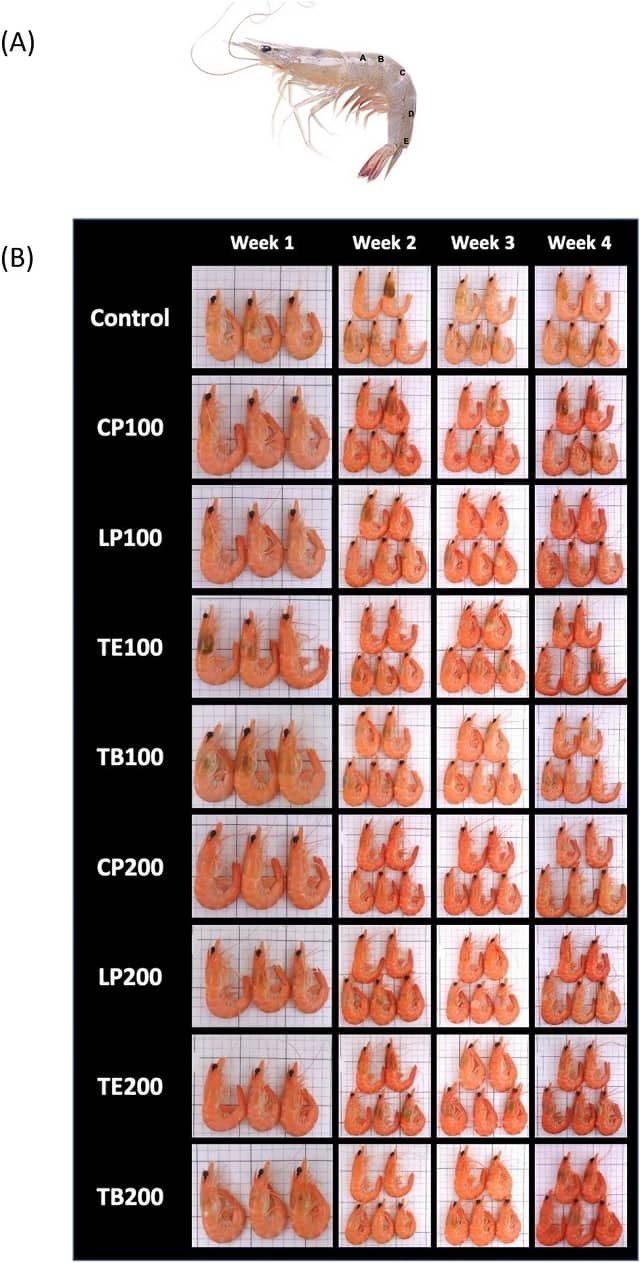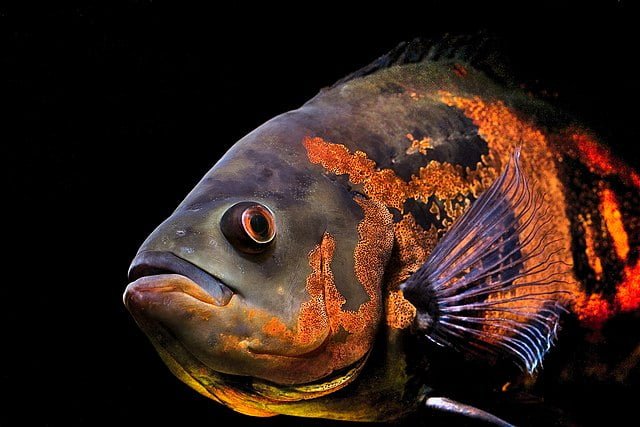In order for shrimp farming to be successful, it is necessary to provide balanced feed that meets the nutritional requirements of the organisms.
Vitamins are essential for proper growth and health of shrimp. To date, the dietary requirements of vitamins such as thiamine (B1), niacin, pyridoxine, and biotin (B7) have been determined. However, the optimal requirement of riboflavin (B12) is not known.
Scientists from Jeju National University conducted a study to determine the dietary requirement of riboflavin and its effects on growth, feed utilization, and diet digestibility in Litopenaeus vannamei shrimp.
They evaluated the inclusion of riboflavin levels of 0, 10, 20, 30, 40, 50, and 60 mg/kg of diet.
Riboflavin – Vitamin B2
Riboflavin is a water-soluble vitamin that is synthesized by plants and most microorganisms. Vitamin B12 is essential for biochemical reactions in all living cells.
Various research reports that riboflavin protects human and animal tissues from oxidative stress by preventing lipid peroxidation and reducing oxidative damage from free radicals and inflammatory cytokines.
Often, vitamin B12 and other vitamins are produced by the intestinal microbiota in animals; however, due to shrimp having a simple digestive tract, their production of riboflavin is low.
Several studies have reported that low or high levels of vitamins in the diet lead to reduced growth and health status of shrimp.
Growth performance
The results of the study showed that optimal levels of riboflavin in the diet can increase growth performance and efficient feed utilization in vannamei shrimp.
Stay Always Informed
Join our communities to instantly receive the most important news, reports, and analysis from the aquaculture industry.
“The growth performance of shrimp gradually increased with the increase of riboflavin up to 40 mg/kg of diet,” they report.
They also report that the final body weight, weight gain, and specific growth rate of shrimp fed with a diet supplemented with 40 mg/kg of riboflavin were significantly higher than the other diets.
Based on the discontinuous two-slope growth model, the scientists determined the optimal level of riboflavin to be 40.9 mg/kg of diet.
Intestinal villus height in shrimp
Histological observations of the villi performed by the scientists illustrated the significant effects of riboflavin on the intestinal morphology of vannamei shrimp. The surface area of the intestine expanded due to the increase in villus height.
According to the study’s results, the villi were significantly longer in shrimp fed diets of 50 mg/kg and 60 mg/kg.
The intestinal villi in shrimp that were not fed riboflavin were significantly shorter than those in shrimp fed with the vitamin. Villi were clearly distinguishable in shrimp fed with high levels of riboflavin.
Conclusion
“The results of this study indicate that riboflavin is essential for increasing growth performance, feed utilization, nonspecific immunity, and intestinal morphology of shrimp,” the scientists conclude.
They suggest that the optimal riboflavin requirement for maximum growth of vannamei shrimp appears to be approximately 40.9 mg/kg of diet.
The study was funded by the National Research Foundation of Korea (NRF) and the Basic Science Research Program of the Ministry of Education.
Contact
Kyeong-Jun Lee
Department of Marine Life Sciences, Jeju National University
Jeju 63243, Republic of Korea
Email: kjlee@jejunu.ac.kr
Reference (open access)
Kokila Sanjeewani, Kyeong-Jun Lee, “Dietary Riboflavin Requirement of Pacific White Shrimp (Litopenaeus vannamei)“, Aquaculture Nutrition, vol. 2023, Article ID 6685592, 11 pages, 2023. https://doi.org/10.1155/2023/6685592
Editor at the digital magazine AquaHoy. He holds a degree in Aquaculture Biology from the National University of Santa (UNS) and a Master’s degree in Science and Innovation Management from the Polytechnic University of Valencia, with postgraduate diplomas in Business Innovation and Innovation Management. He possesses extensive experience in the aquaculture and fisheries sector, having led the Fisheries Innovation Unit of the National Program for Innovation in Fisheries and Aquaculture (PNIPA). He has served as a senior consultant in technology watch, an innovation project formulator and advisor, and a lecturer at UNS. He is a member of the Peruvian College of Biologists and was recognized by the World Aquaculture Society (WAS) in 2016 for his contribution to aquaculture.







